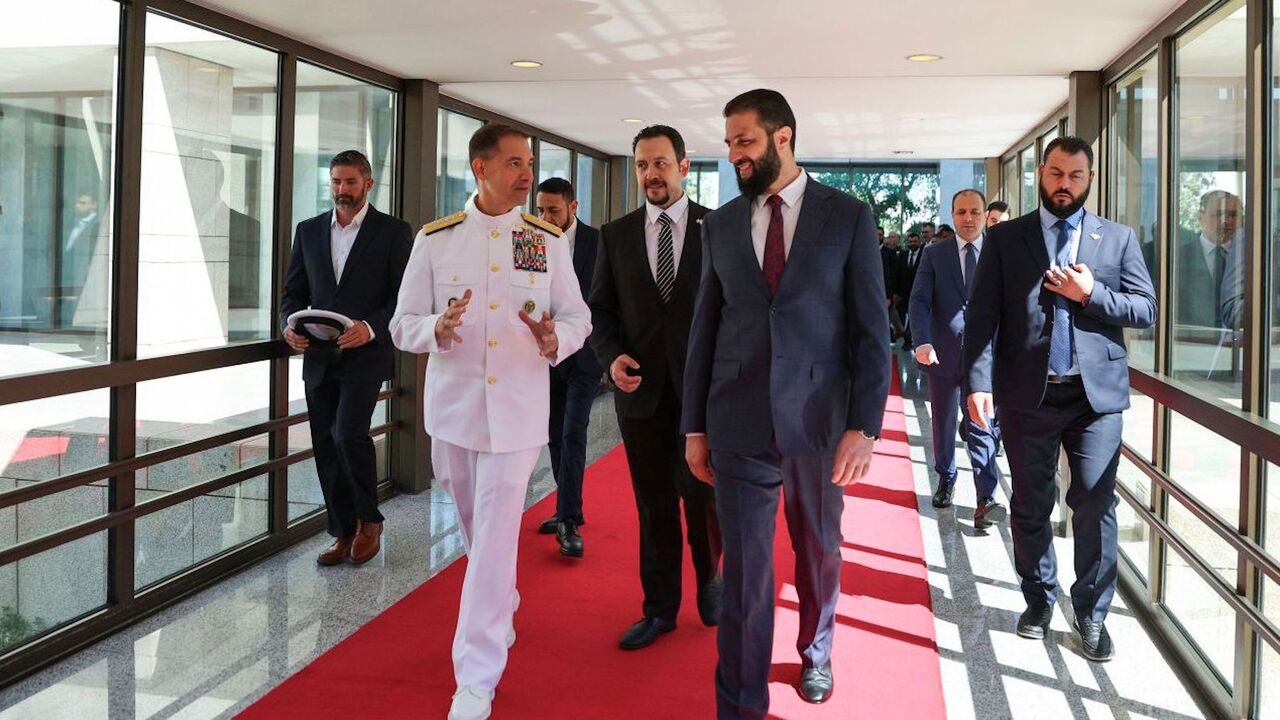WASHINGTON — The top US military commander overseeing forces in the Middle East, Navy Adm. Brad Cooper, met with Syrian leader Ahmed al-Sharaa in Damascus on Friday, marking a new level of diplomacy as Washington pushes the fractured country's various sides to integrate after the fall of the Bashar al-Assad regime.
US Ambassador to Turkey Tom Barrack, who is dual-hatted as Washington’s special envoy for Syria, also attended the meeting, according to the Syrian presidency and US Central Command.
“During the meeting, Cooper and Barrack thanked President al-Sharaa for his support to counter ISIS in Syria,” CENTCOM stated in its press release. “Eliminating the ISIS threat in Syria will reduce the risk of an ISIS attack on the US homeland while working towards President Trump's vision of a prosperous Middle East and a stable Syria at peace with itself and its neighbors,” it read.
The press release went on, “Cooper and Barrack also offered praise to Syria for supporting the recovery of US citizens inside the country, and committed to continuing efforts that support US goals in the Middle East, including negotiations for the integration of various Syrian armed groups into the new Syrian Government’s military.”
Why it matters: Cooper’s high-profile meeting with Sharaa comes as Washington continues to court the former leader of Islamist group Hayat Tahrir al-Sham in a bid to draw Damascus into its orbit after decades of alignment with Russia and Iran during 14 years of brutal civil war.
Barrack has led the Trump administration’s efforts to shore up Sharaa’s fragile rule following the overthrow of the Assad regime last December and the withdrawal of his Iranian backers from the country.
Cooper’s introduction into discussions with Sharaa about Syria’s future adds heft at a time when the US envoy remains engaged on other major diplomatic fronts, including a fragile effort to disarm Hezbollah in Lebanon.
US intelligence and military forces under CENTCOM have been quietly coordinating with Sharaa’s government on hunting down remaining Islamic State figures.
Washington is focused on mediating a formal integration of the Syrian Democratic Forces — an alliance of multiethnic militias led by the secular, leftist Kurdish-led People’s Protection Units — into a unified national military under Damascus’ authority.
That effort has stalled amid disputes as to whether various SDF militias would join the national force wholesale or dissolve and enlist at the level of individual recruits. The impasse reflects a wider, at times bloody debate over religious and ethnic minority groups’ autonomy in post-Assad Syria.
Sharaa, who was once a deputy to ISIS founder Abu Bakr al-Baghdadi before a falling out in 2014, oversees a fragile coalition underpinned by a number of former leaders of his defunct hard-line Sunni Islamist group, HTS — itself an offshoot-turned-rival of al-Qaeda.
Know more: The US military has been drawing down its presence in northeast Syria with eventual plans to consolidate at a single base in Hasakah province near the Rmeilan oilfields, Al-Monitor first reported.
Two US officials told Al-Monitor a longer-term hub is expected to eventually housed at the Northern Landing Zone, an unfinished airstrip near the SDF’s top command headquarters. A notice published on a US government website by the US Army revealed the Defense Department was briefly soliciting contractors to in July for plans to build a "Base Defense Operations Center" at the NLZ.
But officials say the prospect of direct US-Syria military ties remains remote. Formal intelligence-sharing agreements will need to be struck before any status of forces agreement can come into place, and Sharaa's government has to meet a number of steps laid out by Washington before that becomes possible.
The top Democrat on the Senate Foreign Relations Committee, Jeanne Shaheen (D-NH), met with with Sharaa in late August, urging him to ensure protection of minority groups following massacres allegedly involving Damascus' forces in Druze enclave of Daraa. Shaheen also underscored a bill introduced alongside Rand Paul (R-Ky.) that would lift the US' 2019 Caesar sanctions on Syrian institutions if passed.
US officials say the former HTS leader is believed to hold only loose operational control over a hodgepodge of wartime Islamist militias, including Ansar ul-Islam, Ansar ad-Din and other groups that include a few thousand foreign fighters.
Meanwhile, the Pentagon’s top intelligence agency warned in June that some of Sharaa’s former rivals in al-Qaeda are now seeking to curry favor and influence the policies of his post-war Sunni Islamist governing coalition.
Key surviving Huras al-Din officials led by Faruq al-Suri and Sami al-Aridi remain on the US’ list of specially designated global terrorists, although a July UN sanctions report read that “no active ties between al-Qaeda and HTS were observed.”
US Rep. Morgan Luttrell, (R-Tex.), a former Navy SEAL, introduced a measure in the House in February that would require the Department of Homeland Security to report to Congress on designated terrorists remaining in Syria who could pose threats to the US.
The House’s version of next year’s defense spending bill would require the Defense Secretary and CENTCOM commander to brief lawmakers by mid-February on progress and challenges to establishing a formal US defense partnership with the Syrian government.
